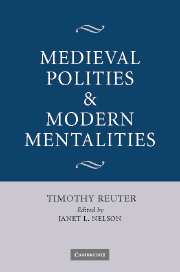Book contents
- Frontmatter
- Contents
- Editor's note
- Acknowledgements
- List of abbreviations
- Editor's introduction
- PART I MODERN MENTALITIES: HISTORIOGRAPHIES, METHODOLOGIES, PRECONCEPTIONS
- PART II THE SYMBOLIC LANGUAGE OF MEDIEVAL POLITICAL ACTION
- 7 Nobles and others: the social and cultural expression of power relations in the Middle Ages
- 8 Regemque, quem in Francia pene perdidit, in patria magnifice recepit: Ottonian ruler representation in synchronic and diachronic comparison
- 9 Contextualising Canossa: excommunication, penance, surrender, reconciliation
- 10 Velle sibi fieri in forma hac: symbolic acts in the Becket dispute
- PART III POLITICAL STRUCTURES AND INTENTIONS
- Index
8 - Regemque, quem in Francia pene perdidit, in patria magnifice recepit: Ottonian ruler representation in synchronic and diachronic comparison
Published online by Cambridge University Press: 12 August 2009
- Frontmatter
- Contents
- Editor's note
- Acknowledgements
- List of abbreviations
- Editor's introduction
- PART I MODERN MENTALITIES: HISTORIOGRAPHIES, METHODOLOGIES, PRECONCEPTIONS
- PART II THE SYMBOLIC LANGUAGE OF MEDIEVAL POLITICAL ACTION
- 7 Nobles and others: the social and cultural expression of power relations in the Middle Ages
- 8 Regemque, quem in Francia pene perdidit, in patria magnifice recepit: Ottonian ruler representation in synchronic and diachronic comparison
- 9 Contextualising Canossa: excommunication, penance, surrender, reconciliation
- 10 Velle sibi fieri in forma hac: symbolic acts in the Becket dispute
- PART III POLITICAL STRUCTURES AND INTENTIONS
- Index
Summary
For German-speakers, the word Repräsentation and its derivates have overtones absent from their relatives in the Anglo-Saxon world. From private citizens invited by advertising to purchase representative items of consumption like furniture or kitchens, through to federal and state presidents, who dispose of substantial budgets for Repräsentation, contemporary Germany is linguistically soaked with a notion of representation implying a display of wealth, taste and solidity appropriate to one's rank in society and affirming that rank. Yet underlying this notion is a deeper sense that representation must imply the independent existence of something to be represented; it may well have a legitimate role of its own, but this cannot be sustained without real substance behind it, and indeed any attempt to ‘represent’ a substance which was not there would be met with ridicule and satire. A similar presupposition is evident in the distinction between the ‘dignified’ and ‘efficient’ parts of a constitution, familiar to English-speaking specialists in political science since it was first formulated as a daringly cynical observation on the role of the monarchy by Walter Bagehot some 130 years ago.Though the ‘dignified’ parts of a constitution (or indeed of any social system) may have a vital role to play in the functioning of the whole, they cannot exist on their own without an ‘efficient’ segment to give them meaning. Medievalists also tend to believe this.
- Type
- Chapter
- Information
- Medieval Polities and Modern Mentalities , pp. 127 - 146Publisher: Cambridge University PressPrint publication year: 2006
- 1
- Cited by

